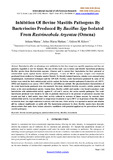| dc.description.abstract | Bacteriocins offer an advantage over antibiotics in that they target very specific organisms and they are generally regarded as safe for humans. The aim of this study was to isolate and identify bacteriocin-producing Bacillus species from Rastrineobola argentea (Omena) and to screen their bacteriocins for their potential as antimicrobial agents against bovine mastitis pathogens. A total of 300 R. argentea samples were randomly purchased from retailers in Gikomba market-Nairobi. To identify isolated bacteria, colonies were assessed using morphological, biochemical techniques and the API KIT. Further, crude bacteriocins produced by some of the isolates were tested for their antimicrobial activity against the bovine mastitis pathogens Escherichia coli ATCC25922 and Staphylococcus aureus ATCC-25923 by well diffusion method. The physicochemical characteristics of the crude bacteriocins produced were also assessed. The study identified Bacillus mycoides, subtilis, pumilus and lentus as the most predominant species. Among these, Bacillus subtilis and pumilus were found to produce crude bacteriocins with antimicrobial activity against E. coli and S. aureus, the bovine mastitis pathogens. The crude bacteriocins produced were found to be fully or partially inactivated in the presence of proteolytic enzymes like trypsin and had a lipid moiety since their activity reduced in presence of lipase enzyme. In contrast, their antimicrobial activity was not affected by temperature treatment of up to 100°C or in presence of ions like copper or iron but there was slight reduction in activity with zinc ions. Their activity was optimal at neutral and alkaline pH but reduced significantly at acidic pH. The bacteriocins produced by these Bacillus species have desirable characteristics that make these isolates attractive candidates with potential application for prevention of bovine mastitis pathogens | en_US |

